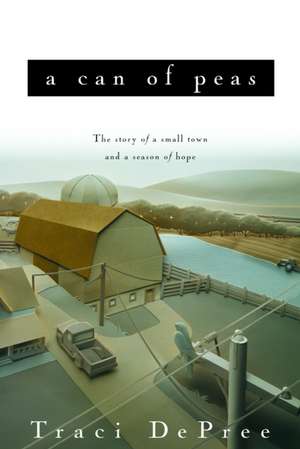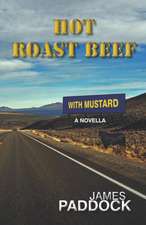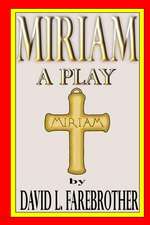A Can of Peas
Autor Traci DePreeen Limba Engleză Paperback – 30 iun 2002
After the death of his grandfather, Peter Morgan and his new bride, Mae, face a life-changing decision: should they embrace the career-chasing ambitions of their family and friends in St. Paul or accept the absurd challenge of saving the family farm in the Minnesota countryside?
Enticed by the romance of a simple, quiet life, the Morgans set out to follow in the footsteps of Peter’s grandparents. Soon, Peter is farming around the clock, barely one step ahead of failure as Mae struggles to find her place in Peter’s life and in the community. Will the strain of saving the farm tear their marriage apart? Was it a mistake to dream?
Preț: 115.07 lei
Nou
Puncte Express: 173
Preț estimativ în valută:
22.02€ • 22.99$ • 18.18£
22.02€ • 22.99$ • 18.18£
Carte disponibilă
Livrare economică 25 martie-08 aprilie
Preluare comenzi: 021 569.72.76
Specificații
ISBN-13: 9781578565238
ISBN-10: 1578565235
Pagini: 320
Dimensiuni: 141 x 210 x 19 mm
Greutate: 0.27 kg
Editura: Waterbrook Press
ISBN-10: 1578565235
Pagini: 320
Dimensiuni: 141 x 210 x 19 mm
Greutate: 0.27 kg
Editura: Waterbrook Press
Notă biografică
Traci DePree is the editor behind many of today’s award-winning and best-selling Christian novels. She brings over a decade of experience in Christian fiction to her writing, offering a blend of earthy Midwest wisdom with deeply rooted conviction. Traci enjoys gardening, visiting with neighbors, and volunteering in her community. She makes her home with her husband, John, and their four children in a rural farming town in Minnesota. Visit her website at www.tracidepree.com.
Extras
Chapter 3
Jim Miller opened the Chuckwagon Café in 1952. Most days of the week he could still be found there, moving from table to table, trading news and jokes with the regulars and laughing his contagious laugh.
True to its era, the Chuckwagon was a white brick building with large windows covering three sides, all slanted outward at the top. The diner was the hub of information for the little town of Lake Emily. The regulars sat and talked about everything from the price of gas and soy-beans to state politics and the school board’s latest referendum. So me-times Arvin, the reporter from the Herald, would hang around looking for last-minute tidbits to fill the week’s pages.
Vernon Elwood sat on the third stool at the red Formica counter, sometimes three meals a day, in his coveralls and a Massey - Ferguson cap. If the restaurant was busy, he’d help out busing or washing tables.
He sat there today, a cup of coffee steaming in front of him as Mae Peter, and Virginia stood in the entry, waiting to be seated.
“ Popular place,” Mae said of the crowded, noisy café.
“ It’s the only restaurant in town, but it’s the best one and the food’s good,” Virginia said, her voice trailing off. Her gaze drifted to a booth in the corner.
“Are you okay, Grandma?” Peter asked.
“I will be,” she admitted. “I haven’t been in here since Roy and I had Sunday dinner two weeks ago at that table. At least this week is over–it gets easier, right?” She clutched her hands in front of herself.
A man with thick eye brows and gray hair got up from his place at the counter. “Virginia,” he said. “I’m so sorry about Roy. I know how hard it is to lose someone.”
“Indeed you do. Thank you, Vernon,” Virginia said sincerel y. Then she turned to Peter and Mae. “This is my grandson Peter and his wife, Mae. This is Vernon Elwood. He farms down the road from us.”
Vernon offered his hand to Peter in a strong shake. “Good man, your grandpa,” Vernon said. “Always had a kind word for everyone, and he played a mean game of hockey. At least as a boy he did.” Virginia’s eyes glistened. “Well,” Vernon continued, “I don’t mean to keep you folks. Let me know if I can be of any help, Virginia.”
He returned to his place at the counter, and Virginia leaned close and said, “His family died in a fire years ago when your dad was in high school.” Peter’s eyes returned to the solitary man, who sat sipping coffee and chatting with the owner.
The waitress, a woman in her fifties with blond hair and suspiciously dark roots, caught their eye. “Over here, buddy,” she said. She pointed to a booth in the corner.
“ Perfect,” Peter said as they followed her.
Once they we re all seated, she passed out menus and began her spiel in a scratchy voice. “The special today is a beef commercial with creamed corn or coleslaw–$5.95. I’ll get some water for you right away.” Then she scooted away to the next table.
“ So what’s this about the farm?” Virginia asked.
“That can wait. Why don’t we order our food first?” Peter said.
“Now you’ve got me worried,” Virginia said, giving Mae a sideways glance.
“Well, all right…” Peter smiled nervously. “We’ve been thinking about something, and we wanted to talk it over with you. ”
“ Okay,” Virginia said.
“We didn’t know what you’d think of the idea.”
“Get to the point, son. You’re as bad as your father.”
“I ’m getting there, Grandma,” Peter protested. “You know that I’ve been looking for work, and I haven’t found the right opportunity – ”
“ I ’m sure something will turn up,” Virginia interrupted.
“Well…after we talked at the funeral, I started wondering if there wasn’t something right under my nose.”
Virginia turned to Mae. “Do you know what he’s talking about?”
“I ’m afraid I do,” she said.
“We want to see what you think of us buying the farm,” Peter said.
There was a long silence. Virginia looked at Peter blankly. “What do you know about running a farm?”
Peter held out his hands and shrugged his shoulders. “I can learn. I work hard. I like the idea of being independent, no boss to answer to, no punching a clock–”
“Actually, the cows set the schedule.”
“But I don’t mind that, Grandma. I’ve never known what I wanted to do, but now I feel as if a light has gone on inside me. I went to college because I was supposed to. But I never loved psychology. This is the first thing that has ever excited me. The more I think about it, the more certain I am of it. I can learn as I go, learn from my mistakes. I’ll take all the advice I can get. I know it’s sudden, but Grandpa’s death made this crystal clear for me.”
Virginia looked at him long and hard and then let out a soft sigh.
She turned to Mae. “And where are you in all this craziness?”
Just then the waitress returned for their orders. “Ok a y, honey, what’ll it be?” she asked Peter, who blushed at her endearment.
“ I’ll have the special, but could I get mashed potatoes instead of the creamed corn?” Peter said, realizing he hadn’t even looked at the menu.
“ Sure thing.” She shrugged her shoulders. She pointed to Mae with her pencil.
Mae ordered a Reuben sandwich, and Virginia opted for the roast pork dinner. Then the waitress disappeared again. They could hear her raspy voice call out the order to the cook.
Mae’s eyes met Peter’s. She began, “To be honest, I’m not as sure as
Peter is. Living with my parents isn’t working out, and I’m glad to see
Peter excited about something. But I’m a city girl, and truthful l y, I’m worried about fitting in, in a small town.” She squeezed his hand.
“At least you’re honest,” Virginia said, tilting her head in thought.
Then she stared Peter in the eye. “You remind me of your grandpa.”
Peter smiled, and then Virginia continued, “He was stubborn too. And he was a dreamer. But he loved farming. Maybe that’s why you’ve always been my favorite–don’t tell your cousins.” She wrinkled her nose. “But
I don’t know … ”
“You said it was Grandpa’s dream to have someone in the family take over for him.” Peter knew he was begging, but he couldn’t help himself.
Virginia chuckled quietly. “Using my own words against me–it’s not fair. ”
“We’d pay whatever you feel the farm is worth. ”
“ Oh hush,” Virginia said. She thought for a moment. “You are right–I would rather keep it in the family, but this would be a big change for you. You haven’t grown up farming like most of the men a round here. There’s no telling if you’ll still like it a month from now.
Anything seems better if you’re looking to get away from a bad situation in St. Paul. Let’s not rush into such a big commitment so fast.”
She paused to consider. “What would you say to a trial period? Say if you worked the farm for a season? I’d charge you rent, same as any other farmer. A hundred dollars an acre per year plus rent on the house and barn. I imagine we’ll have to take out an operating loan, but the monthly check from the creamery and the money you get when you sell the crop should offset that. I can show you Roy’s books so you’ll know what kind of numbers we’re talking here. If you can keep the operation profitable, and you and Mae”–she shifted her gaze – “decide you like the work and living in Lake Emily, we could talk about a long-term arrangement. But I don’t want you to have unrealistic expectations. Farming isn’t an easy life. T h e re’s long hours and plenty of rough spots.”
She was actually saying yes. Peter sat forward in his seat, his face beaming. “That sounds great! What do you think, Mae?” He turned to his wife.
“Watch out, honey,” the waitress interrupted, “these plates are coming in hot and heavy!” She set their meals in front of them. “You must love mashed potatoes.” The waitress glanced at Peter.
There were two huge scoops of potatoes on his plate, one cove red with beef and gravy on top of a slice of bread, the other with just gravy.
Chagrined, he looked over at his grandmother as the waitress disappeared again. “I guess I didn’t know what a beef commercial was,” Peter admitted sheepishly.
“ She didn’t get us any silverware either,” Virginia said. She scooted over on the vinyl seat and got up to rob some from a nearby table.
After Peter said grace, Virginia continued, “Now, where we re we?”
“I think we’re waiting to hear from Mae,” Peter said.
Mae took a deep breath and began, “When Pastor Hickey carried that baby to the old woman–Evelyn, wasn’t it?–there was something that really spoke to me. I felt God whispering in my ear that I need to take a new look at things. I don’t know what that all means, but I’m not so afraid anymore. I guess what I’m saying is, I’m willing to give it a try. ”
“What about your job at the flower shop?” Peter asked.
“ Seemed there was always plenty of work for me at the farm with-out traipsing to town for more–but then you young people do things differently nowadays,” Virginia said.
“ I’ll look around and see what I can find nearby. I’m not in a hurry to start a new job, but I’m sure we could use the income.”
Peter couldn’t seem to stop smiling. “We’re talking like this is a done deal,” he said.
“I suppose it is,” Virginia said.
“ So when do we start?” Peter said.
“ Bert Biddle has been taking care of things for a while now, so I guess the sooner the better. How does tomorrow sound? Bert can teach you the ropes better than I can–and he’s a bit more agile at tossing bales around the hayloft and getting the cows into the barn.” She winked. “Milking starts around six. That okay?”
“ Is that A.M.?” Mae asked. Virginia and Peter both laughed.
“Would you like to come over too, Mae? Not at six, of course, but maybe after you get off work, while the men do their evening milking.
We could have coffee and get better acquainted,” Virginia said.
“ I’d like that,” Mae said.
“You’re going to do what?” Catherine was incredulous. Mae had known her mother would react this way. It was the whole reason she’d wanted to put off telling her.
“We talked to Peter’s grandmother, and we’ve decided to move to
Lake Emily to run the family farm.”
“ Peter doesn’t know anything about farming. This is a failed proposition before it even starts. What makes him think he’ll make any money milking cows? ”
“You’re the one who said he needed to get out there. ”
“And work his way up the corporate ladder, not the hayloft! How could you have agreed to such a lame brained scheme? You’ll be miserable out in the middle of nowhere. ”
“ I’ll be happy as long as I’m with Peter,” Mae retorted.
“ For how long?” Catherine responded. “You’re young. A husband can’t be your happiness forever. At some point you’re going to wake up and discover that he has flaws. You have so much promise. What about your cello? I thought you we re going to pursue your music once you graduated from college.”
“That was your dream, Mom. I don’t have any passion for it.”
“You limit yourself, Mae. And now you’re going to waste away in some boring little backward town. ”
Mae didn’t know what made her more angry–being told she had no common sense or being treated like a child.
“You’re going to end up just like your sister. ”
“What does that mean?”
“You know how Trudy pushes me to see how much of her craziness
I’ll take.”
“ Craziness? Mom, she’s a teacher. She loves kids. She’s creative, intelligent, and happy. Why isn’t that enough? You honestly think she lives her whole life to spite you? ”
“ She’s irresponsible. I was hoping for better from you. Mae, farming is a hard life. It’s … it’s beneath you. Why would you want this for yourself? ”
“ It isn’t only hardship, Mom. T h e re’s a lot that’s good about farming – ”
“ Peter,” Catherine exhaled. “I knew he’d bring you trouble. Doesn’t he care about you at all, look out for what’s best for you? This is going to tear your marriage apart. ”
“Mother!” Mae shouted as tears filled her eyes. “Peter’s my husband and I love him. He isn’t dragging me away against my will. I want to do this, so don’t blame him!” Her face turned hot. She’d never spoken back to her mother. Her daughter-guilt pointed its gnarled finger at her. “If you’re going to try to come between us this way, then I’m afraid–” Her words broke off. “I’m afraid–” She knew what she needed to say, and
yet her courage waned.
“What?” Catherine’s mouth hung open.
“That this is the end of our relationship.” There. She’d said it, yet she immediately regretted her words.
Catherine sputtered. “You would put him before your own mother?”
“I don’t want this any more than you do, Mom, but you’re forcing me to choose.”
“I can’t believe you’re saying this. I only want what’s best for you. ”
“What’s best for me is that I make my own decisions, Peter and I together, whether you agree or not.”
Jim Miller opened the Chuckwagon Café in 1952. Most days of the week he could still be found there, moving from table to table, trading news and jokes with the regulars and laughing his contagious laugh.
True to its era, the Chuckwagon was a white brick building with large windows covering three sides, all slanted outward at the top. The diner was the hub of information for the little town of Lake Emily. The regulars sat and talked about everything from the price of gas and soy-beans to state politics and the school board’s latest referendum. So me-times Arvin, the reporter from the Herald, would hang around looking for last-minute tidbits to fill the week’s pages.
Vernon Elwood sat on the third stool at the red Formica counter, sometimes three meals a day, in his coveralls and a Massey - Ferguson cap. If the restaurant was busy, he’d help out busing or washing tables.
He sat there today, a cup of coffee steaming in front of him as Mae Peter, and Virginia stood in the entry, waiting to be seated.
“ Popular place,” Mae said of the crowded, noisy café.
“ It’s the only restaurant in town, but it’s the best one and the food’s good,” Virginia said, her voice trailing off. Her gaze drifted to a booth in the corner.
“Are you okay, Grandma?” Peter asked.
“I will be,” she admitted. “I haven’t been in here since Roy and I had Sunday dinner two weeks ago at that table. At least this week is over–it gets easier, right?” She clutched her hands in front of herself.
A man with thick eye brows and gray hair got up from his place at the counter. “Virginia,” he said. “I’m so sorry about Roy. I know how hard it is to lose someone.”
“Indeed you do. Thank you, Vernon,” Virginia said sincerel y. Then she turned to Peter and Mae. “This is my grandson Peter and his wife, Mae. This is Vernon Elwood. He farms down the road from us.”
Vernon offered his hand to Peter in a strong shake. “Good man, your grandpa,” Vernon said. “Always had a kind word for everyone, and he played a mean game of hockey. At least as a boy he did.” Virginia’s eyes glistened. “Well,” Vernon continued, “I don’t mean to keep you folks. Let me know if I can be of any help, Virginia.”
He returned to his place at the counter, and Virginia leaned close and said, “His family died in a fire years ago when your dad was in high school.” Peter’s eyes returned to the solitary man, who sat sipping coffee and chatting with the owner.
The waitress, a woman in her fifties with blond hair and suspiciously dark roots, caught their eye. “Over here, buddy,” she said. She pointed to a booth in the corner.
“ Perfect,” Peter said as they followed her.
Once they we re all seated, she passed out menus and began her spiel in a scratchy voice. “The special today is a beef commercial with creamed corn or coleslaw–$5.95. I’ll get some water for you right away.” Then she scooted away to the next table.
“ So what’s this about the farm?” Virginia asked.
“That can wait. Why don’t we order our food first?” Peter said.
“Now you’ve got me worried,” Virginia said, giving Mae a sideways glance.
“Well, all right…” Peter smiled nervously. “We’ve been thinking about something, and we wanted to talk it over with you. ”
“ Okay,” Virginia said.
“We didn’t know what you’d think of the idea.”
“Get to the point, son. You’re as bad as your father.”
“I ’m getting there, Grandma,” Peter protested. “You know that I’ve been looking for work, and I haven’t found the right opportunity – ”
“ I ’m sure something will turn up,” Virginia interrupted.
“Well…after we talked at the funeral, I started wondering if there wasn’t something right under my nose.”
Virginia turned to Mae. “Do you know what he’s talking about?”
“I ’m afraid I do,” she said.
“We want to see what you think of us buying the farm,” Peter said.
There was a long silence. Virginia looked at Peter blankly. “What do you know about running a farm?”
Peter held out his hands and shrugged his shoulders. “I can learn. I work hard. I like the idea of being independent, no boss to answer to, no punching a clock–”
“Actually, the cows set the schedule.”
“But I don’t mind that, Grandma. I’ve never known what I wanted to do, but now I feel as if a light has gone on inside me. I went to college because I was supposed to. But I never loved psychology. This is the first thing that has ever excited me. The more I think about it, the more certain I am of it. I can learn as I go, learn from my mistakes. I’ll take all the advice I can get. I know it’s sudden, but Grandpa’s death made this crystal clear for me.”
Virginia looked at him long and hard and then let out a soft sigh.
She turned to Mae. “And where are you in all this craziness?”
Just then the waitress returned for their orders. “Ok a y, honey, what’ll it be?” she asked Peter, who blushed at her endearment.
“ I’ll have the special, but could I get mashed potatoes instead of the creamed corn?” Peter said, realizing he hadn’t even looked at the menu.
“ Sure thing.” She shrugged her shoulders. She pointed to Mae with her pencil.
Mae ordered a Reuben sandwich, and Virginia opted for the roast pork dinner. Then the waitress disappeared again. They could hear her raspy voice call out the order to the cook.
Mae’s eyes met Peter’s. She began, “To be honest, I’m not as sure as
Peter is. Living with my parents isn’t working out, and I’m glad to see
Peter excited about something. But I’m a city girl, and truthful l y, I’m worried about fitting in, in a small town.” She squeezed his hand.
“At least you’re honest,” Virginia said, tilting her head in thought.
Then she stared Peter in the eye. “You remind me of your grandpa.”
Peter smiled, and then Virginia continued, “He was stubborn too. And he was a dreamer. But he loved farming. Maybe that’s why you’ve always been my favorite–don’t tell your cousins.” She wrinkled her nose. “But
I don’t know … ”
“You said it was Grandpa’s dream to have someone in the family take over for him.” Peter knew he was begging, but he couldn’t help himself.
Virginia chuckled quietly. “Using my own words against me–it’s not fair. ”
“We’d pay whatever you feel the farm is worth. ”
“ Oh hush,” Virginia said. She thought for a moment. “You are right–I would rather keep it in the family, but this would be a big change for you. You haven’t grown up farming like most of the men a round here. There’s no telling if you’ll still like it a month from now.
Anything seems better if you’re looking to get away from a bad situation in St. Paul. Let’s not rush into such a big commitment so fast.”
She paused to consider. “What would you say to a trial period? Say if you worked the farm for a season? I’d charge you rent, same as any other farmer. A hundred dollars an acre per year plus rent on the house and barn. I imagine we’ll have to take out an operating loan, but the monthly check from the creamery and the money you get when you sell the crop should offset that. I can show you Roy’s books so you’ll know what kind of numbers we’re talking here. If you can keep the operation profitable, and you and Mae”–she shifted her gaze – “decide you like the work and living in Lake Emily, we could talk about a long-term arrangement. But I don’t want you to have unrealistic expectations. Farming isn’t an easy life. T h e re’s long hours and plenty of rough spots.”
She was actually saying yes. Peter sat forward in his seat, his face beaming. “That sounds great! What do you think, Mae?” He turned to his wife.
“Watch out, honey,” the waitress interrupted, “these plates are coming in hot and heavy!” She set their meals in front of them. “You must love mashed potatoes.” The waitress glanced at Peter.
There were two huge scoops of potatoes on his plate, one cove red with beef and gravy on top of a slice of bread, the other with just gravy.
Chagrined, he looked over at his grandmother as the waitress disappeared again. “I guess I didn’t know what a beef commercial was,” Peter admitted sheepishly.
“ She didn’t get us any silverware either,” Virginia said. She scooted over on the vinyl seat and got up to rob some from a nearby table.
After Peter said grace, Virginia continued, “Now, where we re we?”
“I think we’re waiting to hear from Mae,” Peter said.
Mae took a deep breath and began, “When Pastor Hickey carried that baby to the old woman–Evelyn, wasn’t it?–there was something that really spoke to me. I felt God whispering in my ear that I need to take a new look at things. I don’t know what that all means, but I’m not so afraid anymore. I guess what I’m saying is, I’m willing to give it a try. ”
“What about your job at the flower shop?” Peter asked.
“ Seemed there was always plenty of work for me at the farm with-out traipsing to town for more–but then you young people do things differently nowadays,” Virginia said.
“ I’ll look around and see what I can find nearby. I’m not in a hurry to start a new job, but I’m sure we could use the income.”
Peter couldn’t seem to stop smiling. “We’re talking like this is a done deal,” he said.
“I suppose it is,” Virginia said.
“ So when do we start?” Peter said.
“ Bert Biddle has been taking care of things for a while now, so I guess the sooner the better. How does tomorrow sound? Bert can teach you the ropes better than I can–and he’s a bit more agile at tossing bales around the hayloft and getting the cows into the barn.” She winked. “Milking starts around six. That okay?”
“ Is that A.M.?” Mae asked. Virginia and Peter both laughed.
“Would you like to come over too, Mae? Not at six, of course, but maybe after you get off work, while the men do their evening milking.
We could have coffee and get better acquainted,” Virginia said.
“ I’d like that,” Mae said.
“You’re going to do what?” Catherine was incredulous. Mae had known her mother would react this way. It was the whole reason she’d wanted to put off telling her.
“We talked to Peter’s grandmother, and we’ve decided to move to
Lake Emily to run the family farm.”
“ Peter doesn’t know anything about farming. This is a failed proposition before it even starts. What makes him think he’ll make any money milking cows? ”
“You’re the one who said he needed to get out there. ”
“And work his way up the corporate ladder, not the hayloft! How could you have agreed to such a lame brained scheme? You’ll be miserable out in the middle of nowhere. ”
“ I’ll be happy as long as I’m with Peter,” Mae retorted.
“ For how long?” Catherine responded. “You’re young. A husband can’t be your happiness forever. At some point you’re going to wake up and discover that he has flaws. You have so much promise. What about your cello? I thought you we re going to pursue your music once you graduated from college.”
“That was your dream, Mom. I don’t have any passion for it.”
“You limit yourself, Mae. And now you’re going to waste away in some boring little backward town. ”
Mae didn’t know what made her more angry–being told she had no common sense or being treated like a child.
“You’re going to end up just like your sister. ”
“What does that mean?”
“You know how Trudy pushes me to see how much of her craziness
I’ll take.”
“ Craziness? Mom, she’s a teacher. She loves kids. She’s creative, intelligent, and happy. Why isn’t that enough? You honestly think she lives her whole life to spite you? ”
“ She’s irresponsible. I was hoping for better from you. Mae, farming is a hard life. It’s … it’s beneath you. Why would you want this for yourself? ”
“ It isn’t only hardship, Mom. T h e re’s a lot that’s good about farming – ”
“ Peter,” Catherine exhaled. “I knew he’d bring you trouble. Doesn’t he care about you at all, look out for what’s best for you? This is going to tear your marriage apart. ”
“Mother!” Mae shouted as tears filled her eyes. “Peter’s my husband and I love him. He isn’t dragging me away against my will. I want to do this, so don’t blame him!” Her face turned hot. She’d never spoken back to her mother. Her daughter-guilt pointed its gnarled finger at her. “If you’re going to try to come between us this way, then I’m afraid–” Her words broke off. “I’m afraid–” She knew what she needed to say, and
yet her courage waned.
“What?” Catherine’s mouth hung open.
“That this is the end of our relationship.” There. She’d said it, yet she immediately regretted her words.
Catherine sputtered. “You would put him before your own mother?”
“I don’t want this any more than you do, Mom, but you’re forcing me to choose.”
“I can’t believe you’re saying this. I only want what’s best for you. ”
“What’s best for me is that I make my own decisions, Peter and I together, whether you agree or not.”
Descriere
Enticed by the simple, small-town life, Peter Morgan and his new wife, Mae, follow in the footsteps of Peter's grandparents on the family farm. Soon, Peter is farming around the clock, barely one step ahead of failure, as Mae struggles to find her place in Peter's life and the community. Sometimes funny and often poignant, these vignettes draw readers into the reassuring rhythms of life as it is in the heart of America.















